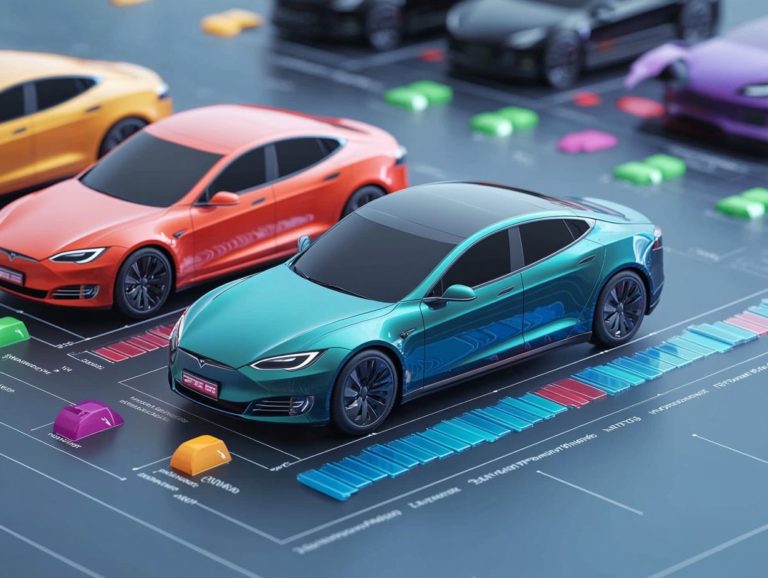budgeting for your first electric vehicle
As the shift towards sustainable transportation accelerates, you’re likely noticing the rising popularity of electric vehicles (EVs) among drivers who value both environmental benefits and cost savings.
This article delves into what electric vehicles are and the numerous advantages of owning one. From significantly reducing your carbon footprint to enjoying substantial savings on fuel costs, there s a lot to consider.
Get ready to uncover key factors that can change your EV experience! You’ll discover practical tips for budgeting your first EV, effective strategies for maximizing your savings, and essential considerations before making your purchase.
Contents
- Key Takeaways
- Benefits of Owning an Electric Vehicle
- Factors to Consider Before Buying an Electric Vehicle
- Budgeting for an Electric Vehicle
- Tips for Saving Money on Electric Vehicles
- Frequently Asked Questions
- What factors should I consider when budgeting for my first electric vehicle?
- Are there any tax incentives or rebates for electric vehicle purchases?
- How can I estimate the ongoing costs of owning an electric vehicle?
- Should I lease or finance my electric vehicle?
- How can I save money on electric vehicle expenses?
- Is owning an electric vehicle cheaper than a gas-powered one?
Key Takeaways

- Consider long-term savings when budgeting for your first electric vehicle. Initial costs may be higher, but lower maintenance and fuel costs can save you money in the long run.
- Calculate the total cost of ownership to get an accurate budget for your electric vehicle, including charging options, insurance, and maintenance costs.
- Utilize financing and incentives to help make purchasing an electric vehicle more affordable. Take advantage of tax credits, rebates, and special financing options for EVs.
What are Electric Vehicles?
Electric vehicles (EVs) represent a big change in the car industry, emphasizing sustainable transportation options that reduce reliance on fossil fuels.
You ll find these vehicles in various forms: all-electric models that run solely on electricity and hybrids that combine combustion engines with electric power for better efficiency.
According to the U.S. Department of Energy, the benefits of electric vehicles go beyond just lowering emissions; they also promise significant savings on fuel costs and reduced maintenance due to fewer moving parts.
Recent studies, including those from Pew Research, show a growing public interest in EV adoption, with nearly 70% of consumers considering an electric car for their next purchase.
Innovations in battery technology, particularly the latest improvements in battery technology, are further boosting vehicle range and charging speed, making electric vehicles increasingly appealing for potential buyers.
Benefits of Owning an Electric Vehicle
Switching to electric offers a wealth of benefits that can positively impact both your wallet and the environment. Picture substantial savings on fuel and maintenance costs, alongside enticing federal incentives and tax credits.
You gain benefits that go beyond the initial cost. By reducing emissions, you contribute to a cleaner planet, turning the switch to an EV into a smart financial move and a commendable choice for the well-being of future generations.
Environmental and Cost Savings
The environmental and cost savings associated with electric vehicles are compelling, making them an attractive option for discerning consumers. By choosing an EV, you re not only reducing your carbon footprint but also adopting a cleaner energy source, drastically lowering greenhouse gas emissions compared to traditional fuel-powered cars.
Consider the numbers: a typical electric vehicle can cut CO2 emissions by about 45% over its lifetime, equating to nearly 150,000 kilograms of greenhouse gases saved. If you own a model like the Tesla Model 3 or the Chevrolet Bolt, you could save between $800 to $1,200 annually just on fuel.
Maintenance costs are also reduced; studies indicate that EVs incur around 50% less in maintenance expenses, thanks to their simpler mechanics.
These advantages clearly show that electric vehicles are not just an eco-friendly choice; they also represent a smart financial investment for those eager to positively impact the environment while enjoying significant savings.
Factors to Consider Before Buying an Electric Vehicle
Before you make the leap to owning an electric vehicle (EV), it’s essential to weigh several key factors to ensure a well-informed purchase.
The price of an EV can vary significantly depending on the model you choose, whether it s the Chevrolet Bolt EUV or the Tesla Model Y. Understanding these initial costs is crucial for any potential buyer.
Beyond up-front expenses, consider factors like charging equipment, electricity rates, and your personal driving habits. For tips on keeping costs low, check out this guide on how to maintain your EV on a budget. These elements can greatly affect your overall satisfaction and the cost-effectiveness of owning an electric vehicle.
Explore your options and make informed decisions to embark on your electric vehicle journey!
Initial Costs and Long-Term Savings

Understanding the initial costs and long-term savings of electric vehicles is key for potential buyers assessing their financial commitment. While the upfront price tag on an EV might seem higher compared to traditional vehicles, the long-term savings on fuel costs and reduced monthly expenses can offer substantial financial benefits over time.
The resale value of electric cars often surpasses that of gasoline vehicles, enhancing their appeal.
When evaluating the total costs over time, it’s crucial to consider factors like maintenance expenses. These costs are typically lower for electric models due to fewer moving parts. The reduced frequency of oil changes and brake replacements can lead to significant savings in the long run.
A thorough cost comparison shows that even though the initial investment may be greater, cumulative benefits such as potential tax credits and incentives make electric vehicles a wise choice.
Ultimately, understanding these details will empower you to make a confident choice.
Infrastructure and Charging Options
Infrastructure and charging options are crucial to owning an electric vehicle, as they determine how easily you can recharge your car. Easy access to reliable charging stations whether public or at home is essential for easing worries about running out of battery and ensuring you can cover daily driving distances without a hitch.
Exploring electricity discounts from local utility companies can enhance the cost-effectiveness of charging your EV. A strong network of charging infrastructure simplifies your transition to electric vehicles and makes the experience more appealing.
Widespread access to charging stations, particularly in urban areas and along major highways, can significantly boost EV adoption rates. Public charging options serve as a lifeline for those who may not have the capability to install home charging equipment.
This accessibility promotes environmental benefits through reduced emissions and fosters a competitive market for electricity pricing. Utility companies initiatives to provide discounts on electricity consumption during off-peak hours incentivize you to charge at optimal times, making electric vehicle ownership sustainable and economical.
Budgeting for an Electric Vehicle
When budgeting for an electric vehicle, it’s essential to understand the various costs that shape total ownership expenses. Learning how to compare electric vehicle ownership costs ensures that as a potential buyer, you are fully prepared for your investment.
The total costs over time encompass not just the purchase price of the EV, but also additional expenses like vehicle registration, insurance, and ongoing charging costs.
By budgeting properly, you can accurately assess your monthly expenses and manage your finances effectively while learning how to prepare for an electric vehicle purchase and reaping the rewards of electric vehicle ownership.
Calculating Total Cost of Ownership
Calculating the total cost of ownership for an electric vehicle is essential for prospective buyers who want to understand the financial implications of this significant purchase. This calculation must include the EV’s purchase price, projected savings on fuel costs, maintenance expenses, and any applicable incentives.
By comparing these costs with those associated with traditional gasoline-powered vehicles, you empower yourself to make informed decisions about investing in a more sustainable option.
One major advantage is the lower fuel costs; electric vehicles usually come with charging rates significantly less than gasoline prices. For example, you could save anywhere from $700 to $1,200 annually on fuel, depending on your driving habits and local electricity rates.
Regarding maintenance, electric vehicles shine with considerably lower expenses. With fewer moving parts than gasoline counterparts, you can expect reduced repair costs over time. Additionally, many regions offer enticing tax credits and rebates that can substantially lower the initial purchase price of an EV, making it a financially astute choice worth serious consideration.
Financing and Incentives
Financing and incentives are key to making electric vehicles more accessible. Exploring vehicle financing options can lower your barriers to entry, while EV incentives like federal perks and benefits from the Inflation Reduction Act can lead to significant savings.
Understanding these financial options is crucial for maximizing your investment. This knowledge helps you navigate the EV market with confidence.
Along with federal tax credits, many state programs and local utility rebates can enhance affordability. The U.S. Department of Energy highlights various state-specific incentives that offer lower financing rates or cash-back offers.
Dealers often provide financing plans tailored for electric vehicles, leading to lower interest rates and better loan terms. Explore all these options to fully leverage financial tools and contribute to a cleaner environment while saving money.
Tips for Saving Money on Electric Vehicles

Saving money on electric vehicles requires embracing smart strategies focused on maintenance, charging, and driving habits.
Prioritizing energy efficiency in your daily usage and being aware of electricity rates can significantly reduce your ongoing costs.
Effective maintenance practices help prolong your vehicle s life and ensure optimal performance, leading to a more economical ownership experience.
Maintenance and Charging Strategies
Proactive maintenance and charging strategies are crucial for maximizing the longevity and efficiency of your electric vehicle. Establishing a consistent maintenance schedule ensures your vehicle operates at its best while minimizing the risk of costly repairs.
Using the right charging equipment and taking advantage of electricity discounts can further enhance your savings and overall ownership experience.
Regularly checking tire pressure, battery health, and brake systems not only helps maintain performance but also promotes safety on the road. Routine inspections every six months, along with timely software updates, allow your vehicle to adapt seamlessly to new technologies.
Integrating efficient charging techniques like utilizing off-peak hours can significantly reduce your energy costs. Remember to check for electricity discounts offered by various energy providers; they can amplify your savings, making the transition to electric vehicles even more appealing.
Final Thoughts and Resources for Further Information
Electric vehicle ownership presents a remarkable fusion of environmental advantages and financial savings, positioning them as an increasingly appealing choice for discerning consumers.
As the market evolves, accessing resources that clarify EV purchase prices, vehicle types, and charging options empowers you to make well-informed decisions.
Diving into comprehensive studies and articles from reputable sources uncovers valuable insights into the long-term cost benefits and incentives associated with electric cars.
Utilizing online tools to compare models, estimate savings, and calculate total cost of ownership will significantly enhance your journey toward electrification.
Engaging with community forums and attending local EV events allows you to gather personal experiences and advice from current owners, enriching your overall understanding.
Embracing these resources will facilitate smarter choices and nurture a deeper commitment to a sustainable automotive future.
Frequently Asked Questions
What factors should I consider when budgeting for my first electric vehicle?
When budgeting for your first electric vehicle, consider several factors: the initial cost of the vehicle, potential tax incentives or rebates, ongoing maintenance and fuel costs, and the cost of a home charging device. For more detailed advice, check out this guide on how to choose the right EV based on your budget, which allows you to charge your vehicle at home.
Are there any tax incentives or rebates for electric vehicle purchases?

Yes! Tax incentives and rebates are often available for electric vehicle purchases. These vary by location and can include federal, state, and local options that help lower your vehicle’s cost.
How can I estimate the ongoing costs of owning an electric vehicle?
You can use online tools and calculators to estimate ongoing costs. They consider factors like your driving habits and electricity rates to show potential savings on maintenance and fuel compared to traditional vehicles.
Should I lease or finance my electric vehicle?
Leasing or financing can help spread out the initial cost. It’s crucial to review the terms and interest rates to make sure it fits your budget.
How can I save money on electric vehicle expenses?
You can save money by using lower electricity prices during off-peak hours and optimizing your charging schedule. Regular maintenance also helps your vehicle run efficiently, saving you more money.
Is owning an electric vehicle cheaper than a gas-powered one?
Electric vehicles often have lower maintenance and fuel costs, making them cheaper over time. However, consider your driving habits and electricity costs to understand your potential savings.






